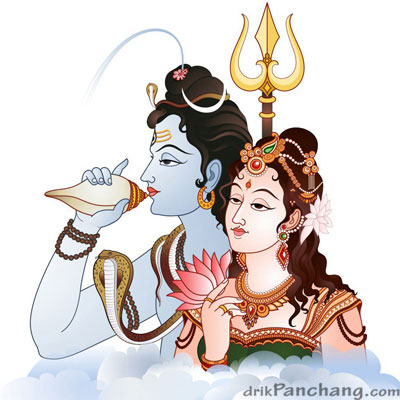



































Notes: All timings are represented in 12-hour notation in local time of Fairfield, United States with DST adjustment (if applicable).
Hours which are past midnight are suffixed with next day date. In Panchang day starts and ends with sunrise.

Shivaratri is great festival of convergence of Shiva and Shakti. Each month, Chaturdashi Tithi during Krishna Paksha is known as Masik Shivaratri.
Masik Shivaratri in month of Magha is known as Maha Shivaratri according to Amanta School. However according to Purnimanta School Masik Shivaratri in month of Phalguna is known as Maha Shivaratri. In both schools it is naming convention of lunar month which differs. However both, Purnimanta and Amanta Schools, celebrate all Shivaratris including Maha Shivaratri on same day.
According to Indian Mythology, in the midnight of Maha Shivaratri, Lord Shiva was appeared in form of Linga. Shiva Linga was first worshipped by Lord Vishnu and Lord Brahma. Hence Maha Shivaratri is known as birthday of Lord Shiva and devotees worship Shiva Linga during Shivaratri. Shivaratri Vrat is popular since ancient time. In Hindu Puranas we get references of Shivaratri Vrat. According to scriptures even Goddess Lakshmi, Indrani, Saraswati, Gayatri, Savitri, Sita, Parvati, Rati observed Shivaratri fast.
Devotees, who want to observe Masik Shivaratri Vrat, can start it from Maha Shivaratri day and continue it for a year. It is believed that impossible and difficult task can be fulfilled by observing Masik Shivaratri Vrats by the grace of Lord Shiva. Devotees should keep awake during Shivaratri and perform Shiva Puja during midnight. Unmarried women observe this fast to get married and married women observe this fast to maintain peace and tranquility in their married life.
Masik Shivaratri when falls on Tuesday becomes highly auspicious. Shivaratri Pujan is suggested during midnight which is known as Nishita Kaal and prevails for two Ghati. DrikPanchang.com lists Nishita Kaal Muhurta to perform Shiva Pujan for all Shivaratri fasts.
Lord Shiva is also known as Bholenath due to his gullible nature.